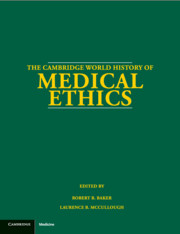Book contents
- Frontmatter
- PART I AN INTRODUCTION TO THE HISTORY OF MEDICAL ETHICS
- PART II A CHRONOLOGY OF MEDICAL ETHICS
- PART III DISCOURSES OF MEDICAL ETHICS THROUGH THE LIFE CYCLE
- PART IV THE DISCOURSES OF RELIGION ON MEDICAL ETHICS
- 9 The Discourses of Hindu Medical Ethics
- 10 The Discourses of Buddhist Medical Ethics
- 11 The Discourses of Confucian Medical Ethics
- 12 The Discourses of Early Christian Medical Ethics
- 13 The Discourses of Orthodox Christian Medical Ethics
- 14 The Discourses of Roman Catholic Medical Ethics
- 15 The Discourses of Protestant Medical Ethics
- 16 The Discourses of Jewish Medical Ethics
- 17 The Discourses of Islamic Medical Ethics
- PART V THE DISCOURSES OF PHILOSOPHY ON MEDICAL ETHICS
- PART VI THE DISCOURSES OF PRACTITIONERS ON MEDICAL ETHICS
- PART VII THE DISCOURSES OF BIOETHICS
- PART VIII DISCOURSES ON MEDICAL ETHICS AND SOCIETY
- Appendix: Biographies: Who Was Who in the History of Medical Ethics
- Bibliography
- Index
17 - The Discourses of Islamic Medical Ethics
from PART IV - THE DISCOURSES OF RELIGION ON MEDICAL ETHICS
Published online by Cambridge University Press: 28 May 2012
- Frontmatter
- PART I AN INTRODUCTION TO THE HISTORY OF MEDICAL ETHICS
- PART II A CHRONOLOGY OF MEDICAL ETHICS
- PART III DISCOURSES OF MEDICAL ETHICS THROUGH THE LIFE CYCLE
- PART IV THE DISCOURSES OF RELIGION ON MEDICAL ETHICS
- 9 The Discourses of Hindu Medical Ethics
- 10 The Discourses of Buddhist Medical Ethics
- 11 The Discourses of Confucian Medical Ethics
- 12 The Discourses of Early Christian Medical Ethics
- 13 The Discourses of Orthodox Christian Medical Ethics
- 14 The Discourses of Roman Catholic Medical Ethics
- 15 The Discourses of Protestant Medical Ethics
- 16 The Discourses of Jewish Medical Ethics
- 17 The Discourses of Islamic Medical Ethics
- PART V THE DISCOURSES OF PHILOSOPHY ON MEDICAL ETHICS
- PART VI THE DISCOURSES OF PRACTITIONERS ON MEDICAL ETHICS
- PART VII THE DISCOURSES OF BIOETHICS
- PART VIII DISCOURSES ON MEDICAL ETHICS AND SOCIETY
- Appendix: Biographies: Who Was Who in the History of Medical Ethics
- Bibliography
- Index
Summary
INTRODUCTION
The close connection between faith, society, and the responsibility of the individual provided a basis on which faith and morality could remain an indivisible unity. The structure and moral implications of the articles of faith, basic responsibilities, and normative values in Islam exclude a clear division between the religious and private spheres (Antes 1982, 40; Ess 1980, 70–71). Like all other areas of experience, illness is also one of the parts of life on which the Islamic faith takes a particular perspective and for which it provides corresponding norms of behavior.
For Muslims, the Quran and the traditions of the Prophet Muhammad (Sunna) are the main sources of what is morally good and normative. The Quran, the sacred scripture of Islam, contains the verbatim word of God that was revealed to the Prophet Muhammad in Arabic between 610 and 632. The Prophet Muhammad (570–632) applied the general instructions of the Quran in his behavior and manners and gave Muslims directions in issues that were not regulated in detail in the Quran. Because the Islamic textual sources, which date from the seventh to ninth centuries, are also the basis for ethical practice in the area of medicine, this chapter will concern itself initially with the concepts of health, disease, and illness presented in these sources and the moral obligations for practitioners and patients that can be derived from them (see also Chapter 25). The meaning and justification of medical skill and a number of medical–ethical principles will also be discussed.
- Type
- Chapter
- Information
- The Cambridge World History of Medical Ethics , pp. 270 - 278Publisher: Cambridge University PressPrint publication year: 2008



